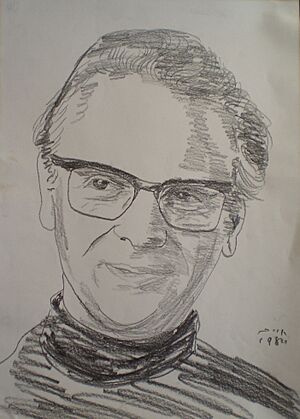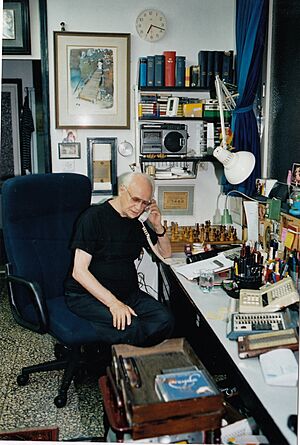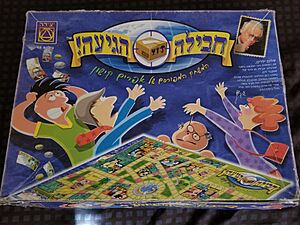Ephraim Kishon facts for kids
Quick facts for kids
Ephraim Kishon
|
|
|---|---|
 |
|
| Born |
Ferenc Hoffmann
August 23, 1924 Budapest, Hungary
|
| Died | January 29, 2005 (aged 80) Appenzell, Switzerland
|
| Nationality | Israeli |
| Spouse(s) | Eva Klamer (1946–58) (divorced) Sara Kishon (1959–2002) Lisa Witasek (2003–05) |
| Children | Rafael Kishon (born 1957) Amir Kishon (born 1964) Renana Kishon (born 1968) |
Ephraim Kishon (Hebrew: אפרים קישון: August 23, 1924 – January 29, 2005) was a famous writer, playwright, and film director from Israel. He was born in Hungary. He was known for his funny and clever stories, especially his satire. Satire uses humor, irony, or exaggeration to make fun of people's mistakes or foolishness.
Kishon was one of the most popular writers in Israel. His books were also very well-liked in countries where German is spoken. He even directed films that were nominated for an Oscar!
Contents
About Ephraim Kishon's Life
Ephraim Kishon was born on August 23, 1924. His birth name was Ferenc Hoffmann. He grew up in a Jewish family in Budapest, Hungary. His father was a bank manager, and his mother was a secretary. He also had a sister who became a writer.
Early Life and World War II
Ephraim showed a talent for writing when he was young. In 1940, he won his first writing prize for a novel. During World War II, Hungary had strict laws against Jewish people. Because of these laws, he could not go to university. So, in 1942, he started studying how to make jewelry.
During the war, the Nazis put him in several concentration camps. These were terrible places where many people were held against their will. In one camp, he survived because he was good at chess and played with the guards. In another camp, the Germans were shooting prisoners, but he was lucky and was passed over.
He later wrote about this, saying, "They made a mistake—they left one satirist alive." He managed to escape while being moved to another camp. He then hid for the rest of the war, pretending to be a Slovak worker.
After the war, he returned to Budapest. He found out his parents and sister had survived. However, many other family members had died in the gas chambers at Auschwitz. In 1945, he changed his last name to Kishont. He continued to study art and writing in Hungary. By 1948, he was publishing funny articles under the name Franz Kishunt.
Moving to Israel
In 1949, Ephraim moved to the new country of Israel. This move is called Aliyah. He went with his first wife, Eva Klamer, to escape the Communist government in Hungary.
When he arrived in Israel, an officer changed his name. He officially made his name "Ephraim Kishon." Kishon said the clerk asked his name, and when he said "Ferenc," the clerk wrote "Ephraim." The clerk also changed his last name to Kishon, which is a river in Israel.
His first marriage ended in divorce. In 1959, he married Sara Lipovitz, who passed away in 2002. In 2003, he married Lisa Witasek. Ephraim Kishon had three children: Raphael, Amir, and Renana.
In 1981, Kishon also made a home in Switzerland. He felt that some people in Israel's media were not fair to him. This was because he had strong political views.
Ephraim Kishon passed away on January 29, 2005, in Switzerland. He was 80 years old. His body was brought back to Israel. He was buried in the Trumpeldor Cemetery in Tel Aviv.
Ephraim Kishon's Writing Career
When Kishon first arrived in Israel, he lived in a temporary camp. Then he moved to a Kibbutz (a community farm) called Kfar Hahoresh. He worked as a nurse there. In his free time, he learned the Hebrew language very quickly. He even wrote funny stories for a Hungarian newspaper.
After moving to a new home, he studied Hebrew more. He became very good at the language. Even so, he always spoke with a strong Hungarian accent.
Becoming a Famous Writer
In 1951, just two years after moving to Israel, Kishon started writing. He wrote a regular funny column for a Hebrew newspaper called Omer. Later, he wrote for the important newspaper "Davar". In this paper, he published a satire called "The Blaumilch Canal."
That same year, he published his first book in Israel. It was called "Ha-ole Ha-Yored le-Chayenu," which means "The Pestering Immigrant." This book was first written in Hungarian and then translated into Hebrew. It was mostly about the funny experiences of new immigrants in Israel in the 1950s.
In 1952, Kishon began writing a regular satirical column for the newspaper "Ma'ariv". It was called "Had Gadya." He wrote this column for about 30 years. For the first 20 years, he wrote a new column almost every day! Soon, he became one of the most important humor writers and satirists in Israel.
Kishon was very creative with language. He was also great at creating interesting characters. His humorous writings were collected into books. These books were published in Hebrew and translated into many other languages. Some English titles include Look Back Mrs. Lot (1960) and Noah's Ark, Tourist Class (1962). He also wrote books about the Six-Day War, like So Sorry We Won (1967).
Kishon's books have been translated into 37 languages. They were especially popular in Germany. He once said that it made him happy to see the grandchildren of those who caused the Holocaust buying his books. This showed that people could move past old hatreds.
Kishon and Chess
Ephraim Kishon loved playing chess his whole life. He was also very interested in chess-playing computers. In 1990, a German company made a chess computer called the Kishon Chesster. This computer was special because it would make funny comments during the game. Kishon wrote these comments himself. They were humorous but also helpful for the game.
Books, Plays, and Films by Ephraim Kishon
Books
- Ha-ole Ha-Yored le-Chayenu (1951)
- Thousand of Gadia and Gadia (1954)
- Ein Kamonim (1955)
- Do Not Worry (1957)
- Sketches (1959)
- It All Depends (1958)
- Be-Echad Ha-Emeshim (1961)
- He and She (1963)
- Somersaults (1964)
- Bone in the Throat (1966)
- So Sorry We Won! (1967)
- Gomzim Gomzim (1969)
- For (1970)
- Oh, Winners (1970)
- Department of Ephraim Kishon (1972)
- Wole in the Screen (1973)
- Partachia my Love (1974)
- My Family Right or Wrong (1977)
- Smile drought (1978)
- Family Book (1980–current)
- Jonathan Voyage (1981), children book
- The Cup is Ours (1981), children book
- Uncles on the Wires (1981), children book
- Unfinished Adventure (1981), children book
- Gum with Stripes (1981), children book
- Seven Comedies (1981)
- Satire Book I (1981)
- Arbinkea (1991)
- Satire Book II (1991)
- Satire Book III (1992)
- 58 Sketches (1995)
- Ants War (1995) children books
- Hercules and the Seven Midgets (1995) children books
- The Taming of the Shrew Dog (1995) children books
- Hairy, Hell (1998)
- State Protocol (1999)
- The Redhead with the Key (2002) children books
- Book of Travels (2003)
- Partachia (2004)
- Picasso's Sweet Revenge (2004)
Plays
- His Reputation Precedes Him (1953)
- Black on White (1957)
- Ha-Ketubbah (1959)
- No Word to Morgenstein (1960)
- Take the Plug Out (1968)
- Oh, oh, Juliet (1972)
- Salah Shabati the musical (1988)
- Open for Renovation (2004)
- The Policeman (2009)
Kishon's plays have been performed on stages and television all over the world.
Films
Kishon also became a film director in the early 1960s. He wrote, directed, and produced five funny and satirical movies. Three of his films were nominated for big international awards. These include the Golden Globe award (which he won twice) and the Oscar (nominated twice).
- Sallah Shabati (1964): This film was nominated for an Oscar for Best Foreign Language Film. It is a comedy about the challenges new immigrants faced in Israel. It also showed how some people treated immigrants unfairly. This movie helped Ephraim Kishon become famous around the world. It also introduced the actor Chaim Topol to a global audience.
- Ervinka (1967): Kishon wrote and directed this film. It stars Chaim Topol. It is a funny story about a con man who falls in love with a police officer.
- Blaumilch Canal, also known as The Big Dig (1969): This film was nominated for a Golden Globe in 1971. It is an Israeli comedy that makes fun of how complicated and silly government rules can be. It shows what happens when a crazy person starts digging a canal in the middle of a city.
- The Policeman, original Hebrew title Ha-Shoter Azoulay (1971): This film was nominated for an Oscar for Best Foreign Language Film. It won the Golden Globe for Best Foreign Language Film in 1972. It also won other awards, like best foreign film in Barcelona. In Israel, it is considered a classic movie.
- The Fox in the Chicken Coop (1978): This movie is based on Kishon's satirical book. It features many famous Israeli actors. The film takes a funny look at older Israeli politicians.
Awards and Recognition
Ephraim Kishon received many awards for his work:
- 1953: Nordau Prize for Literature
- 1958: Sokolov Prize for Journalism
- 1964: Kinor David (David's Harp) Prize
- 1970: Herzl Award for Hungarian Jewry
- 1998: Bialik Prize for Hebrew literature (shared with others)
- 2002: Israel Prize for his lifetime achievements and contributions to Israel. This is one of the highest honors in Israel.
Kishon was nominated two times for an Academy Award for Best Foreign Language Film. He was also nominated three times for a Golden Globe Award. He won two Golden Globe Best Foreign Language Film Awards for his films Sallah Shabati (1964) and The Policeman (1971).
Images for kids
-
Kishon talking with Prime Minister Yitzhak Rabin, 1992
-
Kishon at the Aachen carnival in West Germany, 1978
See also
- List of Bialik Prize recipients
- List of Israel Prize recipients
- Golden Globe Award for Best Foreign Language Film#1960s
 | DeHart Hubbard |
 | Wilma Rudolph |
 | Jesse Owens |
 | Jackie Joyner-Kersee |
 | Major Taylor |








